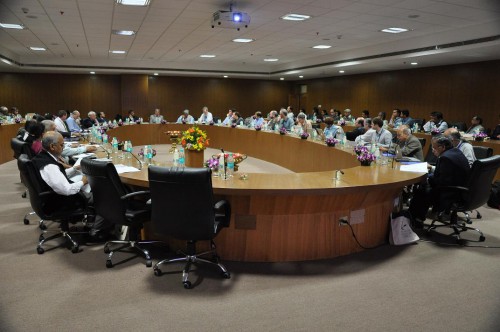15th February 2013 New Delhi, India
The atmosphere’s great in Indo-UK climate science!
Last week was an exceptional week in taking the UK-India relationship in climate science to an even higher level, from an already strong position. The week was jam-packed with three events, two of which ran in parallel.

The first was the joint Indian Ministry of Earth Sciences (MoES) – UK’s Natural Environment Research Council’s (NERC) scoping workshop for cooperation on monsoon research from 4-6 February, building on India’s National Monsoon Mission, under which MoES have identified UK Met Office’s Unified Model, which is used all round the world, as the model they will use to improve medium-range scale forecast (up to 15 days) of rainfall.
The workshop saw the convergence of 15 key scientists from the UK and around 50 leading scientists from India to the MoES building in Delhi. The outcome was an intensive two days of discussions on where it makes sense for the two sets of communities to work together.
The two funders have now gone back with the points that emerged from the discussions and will hopefully return with a call for proposals for joint collaborations. Look out for notes from the meeting at the NERC website and RCUK India website in the coming weeks. And of course, we’ll let you know as soon as there is any news on funding!
The second event was the HIGHNOON Spring School which was organised by IIT Delhi from 4-7 February and funded by UKAid/DFID’s South Asia Research Hub, to enhance modelling capabilities of researchers of the South Asian region. It saw enthusiastic attendance by around 30 researchers from six countries and the UK’s support for this capacity building school was highly appreciated.
The final event of the week was from 7-8 February, again hosted by MoES at their excellent conference facilities. This saw the coming together of Project Investigators and project partners that have been funded by MoES and NERC under their Changing Water Cycle programme.
It was also attended by representatives from Indian Ministry of Water Resources, Central Water Commission and Central Ground Water Board which gave the participants an added advantage to explore other possibilities of joint working, including those provided under the Indian National Water Mission. Prof Gaur, Honorary Scientist from C-MMACS and co-chair of the India-UK CWC programme summed it up nicely at the end as “It has been one of the most remarkable collaborative programmes that I have seen.”
It’s always a pleasure to be able to sit among scientists who are passionate about their research and debate how they can work with each other. Such platforms open up greater avenues for excellence in science which in turn have the potential to find its ways to applications that can positively affect the common man.
My only regret of the week is that I managed to miss being in the group photographs every time (!) by a fraction of a minute.
Hello,
I found you via the DECC eNewsletter.
We saw recently that India Rail is concerned about its Diesel Engine emissions which will be polluting across India and the economic rising cost of diesel.
We would like to collaborate with atmospheric and emissions bodies in India to test and demonstrate our unique and proven HOD Hydrogen On Demand Technology.
There is a Rail Fuels Development organisation I believe that maybe with FCO, Science + Innovation we should be talking to.
A great Indo – UK opportunuity, we would very much wish to assist in reducing the Rail Carbon footprint.
I very much doubt that there will be a “call” for this tech as it is so unique.
Kind regards,
Jon Sampson
Dear Jon,
Many thanks for the comment, and apologies for the slight delay in responding – I’ve been offline for a few days. And great to hear we made it into DECC’s eNewsletter!
This certainly sounds like an interesting proposition – you can’t get much more ‘up our street’ than an innovative, low carbon product, with UK-India potential! Let me talk to a few people in our team early next week and perhaps we could discuss what technology you have and what you’re looking for.
Expect to hear from me offline!
Have a good weekend, Tom
I wish to participate in this programme as I am also involved in atmospheric science research.
Dear Dr Kumar, I’m delighted to hear you’re interested in participating in future Indo-UK research initiatives. If you check this blog regularly, or subscribe to our monthly newsletter, you’ll be among the first to hear about future opportunities, including the potential for a joint call on Monsoon Modelling that Rita alludes to in her post.
However, from your impressive publication list I can see you primarily work in atmospheric chemistry. If a specific project or call is developed in this area, I’d be very happy to let you know about it.
We’ve also broken this blog up by theme, so you can keep up to date with only the subject areas that interest you. There’s more explanation on our ‘About’ page:
http://localhost:8888/science-innovation-network-india/about/
Best wishes,
Tom